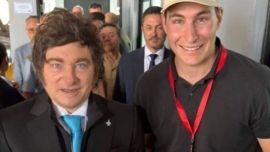The direction of the Mercosur has been in question for years and now it looks to be in danger of splintering. Less than a week before the leaders of the member states are due to meet in Montevideo for a high-level summit – an event at which President Alberto Fernández is due to take on the body’s pro-tempore presidency – the regional trade bloc is gripped by internal conflict.
The governments of Argentina, Brazil and Paraguay have warned Uruguay that it may be subjected to legal and commercial sanctions if it signs up to trade deals without the approval of its partners. The nations warned their partner that they “reserve the right to adopt any measures they deem necessary to defend their interests in the legal and commercial spheres.”
The three countries say President Luis Lacalle Pou’s government, which has regularly voiced its desire to sign agreements unilaterally, is in contravention of the bloc’s rules that say member states must negotiate jointly or have the approval of its partners to do so.
The diplomatic admonishment, issued by the foreign ministries of Argentina, Brazil and Paraguay simultaneously, sets the scene for a dramatic showdown at next week’s Mercosur presidential summit, scheduled for December 5 and 6 in Montevideo.
Taking questions from reporters at a press conference, Lacalle Pou said this week that Uruguay had “every right” to negotiate its own deals.
"We feel we have every right to do so," Lacalle told a press conference, responding to reports that Uruguay will seek to sign the Comprehensive and Progressive Agreement for Trans-Pacific Partnership (CP-TPP, also known as TPP11), a trade deal that covers the economies Australia, Brunei, Canada, Chile, Japan, Malaysia, Mexico, New Zealand, Peru, Singapore, and Vietnam and accounts for 13 percent of the world's GDP and a market of more than 500 million inhabitants.
Lacalle told reporters on Wednesday that he understood but did not share the demands made by Argentina, Brazil and Paraguay.
"We have been very upfront, we have been upfront in Mercosur meetings. And we have one next week, which is going to be entertaining," he said with a smile, referring to the upcoming summit.
"We are assisted by international law, we are assisted by recent events of decisions that are not taken by consensus [within Mercosur], for example the first lowering of [trade] tariffs agreed between Brazil and Argentina," he said.
Warning
Lacalle Pou has made it clear on several occasions that he is seeking to sign unilateral free-trade agreements and join existing deals, against the wishes of the governments led by Alberto Fernández (Argentina), Jair Bolsonaro (Brazil) and Mario Abdo Benítez (Paraguay).
Uruguay's Foreign Minister Francisco Bustillo is currently on a tour of Australia and New Zealand. He was expected to deliver a letter of application to join the CPT-PP before the weekend.
Montevideo is also discussing a free-trade agreement (FTA) with China despite opposition from Argentina and Paraguay, a move that has further strained ties between Mercosur nations.
News of Uruguay’s intentions have succeeded in uniting the governments of Argentina’s Alberto Fernández and Brazil’s Jair Bolsonaro, who have been at diplomatic odds ever since the Peronist leader took office in December 2019.
Joining forces to express their dismay, Argentina, Brazil and Paraguay criticised the "actions of the Uruguayan government with a view to the individual negotiation of trade agreements” and expressed concern over reports Uruguay will imminently deliver a “request for accession to the Comprehensive and Progressive Agreement for Trans-Pacific Partnership (CP-TPP)."
"The National Coordinators of Argentina, Brazil and Paraguay before the Mercosur Common Market Group have the honour to communicate to the National Coordination of Uruguay that the three countries reserve the right to adopt any measures they deem necessary to defend their interests in the legal and commercial spheres," read a joint communiqué signed by the foreign ministries of the three countries.
Speaking at a press conference this week, Argentina’s Cabinet Chief Juan Manzur said that Uruguay’s decisions “have an impact” on all member states and called for talks to “strengthen dialogue, rapprochement and the necessary consensus.”
In addition to the creation of Mercosur as the region's main trade bloc in March 1991, treaties such as the Asunción Treaty (1991) and the Ouro Preto Treaty (1994) established procedures to prevent member countries of the South American bloc from negotiating unilaterally with third parties or complying with a series of requirements when initiating a series of negotiations.
– TIMES/AFP/NA






















Comments